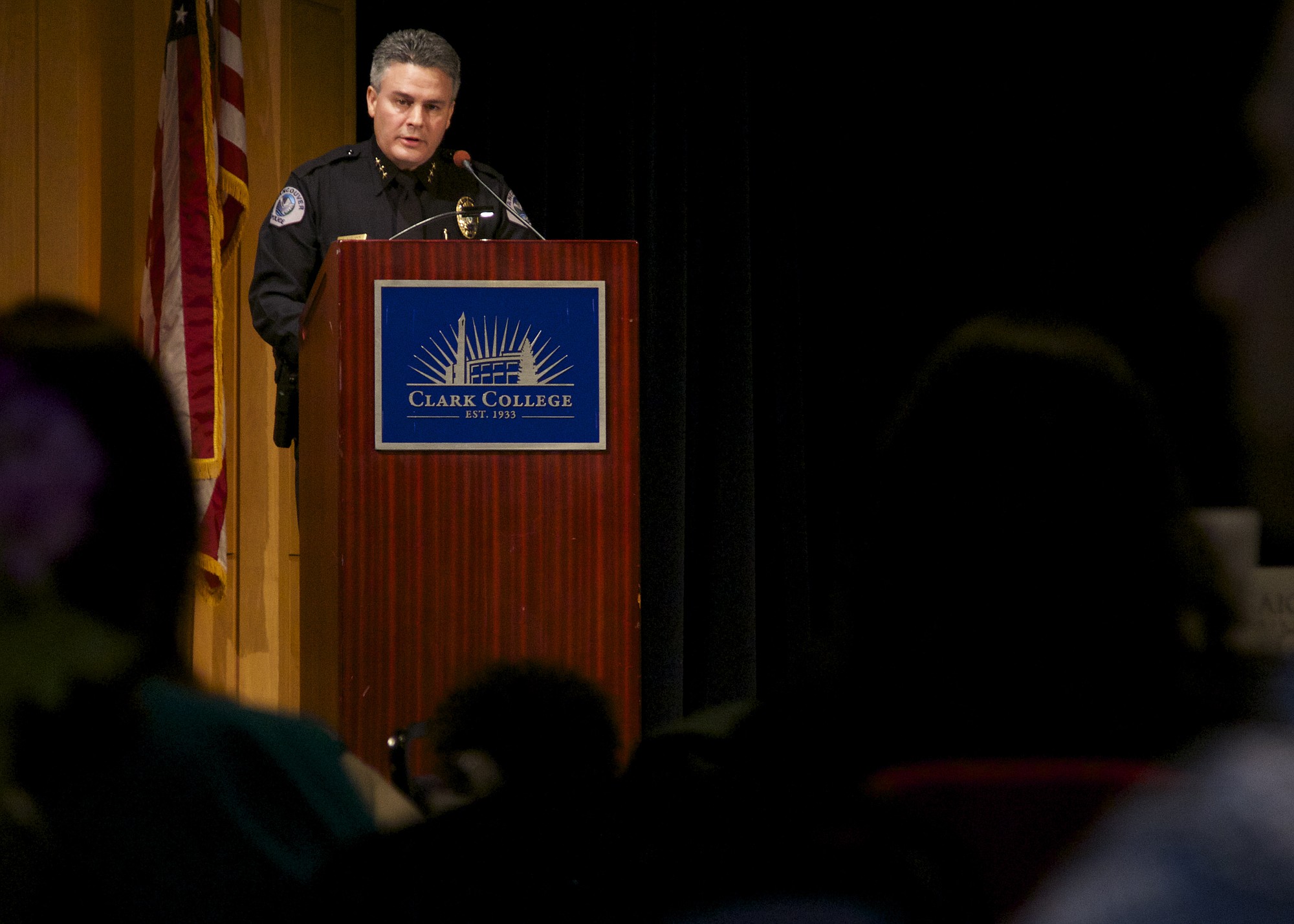In the tense and uncertain history of race relations in America, a recent string of high-visibility killings of unarmed blacks by police and others has made this a particularly tense and uncertain moment.
Vancouver Police Chief James McElvain, a special guest at Saturday morning’s fifth annual Martin Luther King Jr. breakfast celebration at Clark College, acknowledged the problem but told the crowd of several hundred that “the police industry” is changing, and Vancouver is leading that change.
He said that police nationwide, and notably in Washington state, are leaving behind a “warrior mentality” to embrace a “community guardian” approach where listening, explaining, dignity and equity are paramount.
It’s too easy for people to misjudge and misunderstand one another due to race or religion or any other comfortable, familiar dividing line, McElvain said. Trending news of police shootings can strengthen those divisions and “fray the social fabric” of our nation, he said.
“What about the thousands of incidents we never hear about,” McElvain pointed out, where people work together and find common ground despite differences, where there’s mutual support and peaceful resolution by people who choose what’s right instead of what’s the quickest reaction?
McElvain said we are all on a “lifelong quest to learn from our mistakes” and build better lives. That means building a more diverse community, he said.
The Vancouver police have well-established citizen groups, including a diversity advisory team and a volunteer citizen crime-prevention patrol, that are all about building bridges between police and neighbors, he said. And McElvain himself, a 29-year police veteran who came to Vancouver in late 2013, said he has met with interfaith religious groups and Vancouver’s main black congregation, the Community A.M.E. Zion Church, to make sure those bridges are being used.
McElvain urged everybody to get involved in building a better community. He challenged the crowd to “look past the negativity of the world around us and … seek the good. We are all in this together.”
Event organizer Deena Pierrot subtitled this fifth annual King breakfast “The new movement … a change has come,” precisely because of this recent wave of black deaths, she said, and a revived awareness that there’s still a long way to go to achieve real equality in the United States.
Keynote speaker Daymond Glenn, an assistant professor of urban studies and chief diversity officer at Warner Pacific College in Portland, emphasized the same theme.
Glenn noted that the seeming avalanche of news in recent months regarding police shootings of black men in places like Ferguson, Mo., has worn down even his own sense of injustice and outrage. When a grand jury in Ferguson declined late last year to indict a white police officer for shooting an unarmed black teen there, Glenn shrugged it off as totally routine.
“No indignation” is what he felt. “Injustice can be so normalized, it feels like business as usual.” Glenn said he prayed about his own lack of reaction — and he got a strong answer.
He said one evening he dropped an envelope in a friend’s mailbox in a “nice neighborhood” of northeast Portland; he drove down the street and pulled over to text his friend. Then his son, who was in the car with him, noticed a white man standing on the corner, staring suspiciously at them. The man came over.
“Can I help you?” asked Glenn, who is black.
The white man made it clear, in not so many words, Glenn was unwelcome in that neighborhood. The fact that Glenn was wearing a suit and tie and accompanied by his son didn’t seem to matter, Glenn said.
It’s been 50 years since Martin Luther King Jr. led his famous voting-rights march on Selma, Ala., which helped to spur passage of the landmark 1965 federal Voting Rights Act; but the prize remains elusive, Glenn said.
“The hardest thing is for the Negro to have real equality in America,” he said.





